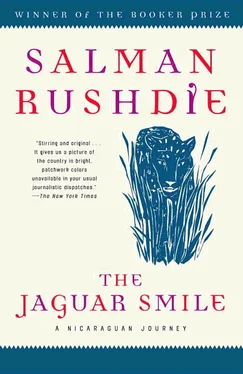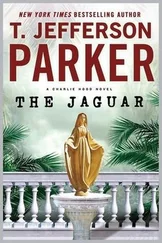Today, however, was about a different kind of communication. The phone call Ortega was on his way to make represented the ceremonial inauguration of the ‘Inter-Sputnik’ communications link between Nicaragua and the countries of the socialist bloc. We arrived at the dish antenna, which sat in the Managua hills not far from the wooden FSLN sign, and listened to speeches from Russian dignitaries. The new installation had been paid for by the USSR, and the US was already calling it a spy base. It looked like a telephone system to me.
As Daniel Ortega telephoned first his ambassador in Havana and then Nicaragua’s man in Moscow, the stupidity of US policy seemed glaringly obvious. In Nicaragua, there were old Jack Nicholson movies on the television, Coca-Cola did great business, the people listened to Madonna on the radio, singing about living in a material world/and I am a material girl ; baseball was a national obsession, and people spoke with pride of the number of Nicaraguans who had made the major leagues in the United States. In the old Somoza days, when the newspapers were censored, they would print photographs of Marilyn Monroe and other Hollywood movie stars in place of the banned articles, creating what may be a unique alliance of Hollywood with radical protest. In Nicaraguan literature, too, the US influence was of enormous importance. The country’s poetry had been profoundly affected by the work of Walt Whitman and Ezra Pound.
Now, however, there was the economic blockade. A shipment of Dutch cranes, en route to Nicaragua, had been impounded by the US authorities in the Canal Zone. IBM had withdrawn all service facilities from Nicaragua, obliging an already impoverished country to change, at great expense, from IBM computers to other, less ideologically motivated brands. (What would become, I wondered, of the IBM word processor Sergio Ramírez had shown me with all the eagerness and pride of a new-technology nut?) Most recently, Oxfam America had been prevented by the Reagan administration from sending a $41,000 shipment of seeds, hoes and farm equipment to Nicaragua.
It was impossible to spend even a day in Nicaragua without becoming aware of the huge and unrelenting pressure being exerted on the country by the giant standing on its northern frontier. It was a pressure that informed every minute of every day.
In the morning paper, Nicaragua’s leading cartoonist, Roger, had drawn a gigantic Uncle Sam, who was bending over and peering through binoculars at a tiny Nicaraguan house the size and shape of Snoopy’s dog kennel. ‘Yes,’ read his speech balloon, ‘I can see it clearly: they’re definitely planning to invade.’
The ‘Peanuts’ strip, by chance, had just run an American variation on the same theme. Linus, Snoopy, and, if memory serves, Lucy sat watching TV, dressed up in camouflage combat fatigues. ‘What’s he saying now?’ the girl asked. Linus replied, ‘The same thing he said yesterday. He says there are people out there who want to destroy our way of life.’ ‘I don’t trust him,’ said Lucy or Patty or whoever it was. ‘Really? Why is that?’ ‘I don’t trust anybody.’
The Soviet ministers stood beside Daniel Ortega as he made his call to Moscow. The New York Times , in a leader article, had just called the Sandinistas ‘Stalinists’. Stephen Kinzer, the paper’s man in Managua, had belatedly filed a report (without visiting the scene) on the most recent Contra atrocity, the mining of a road in northern Jinotega province, near Bocay. The mine had blown up a bus and killed thirty-two civilians, including several schoolchildren. Kinzer’s report suggested that the FSLN could have planted the mine itself, in a bid to gain international sympathy.
Pressure, and a phone call to Moscow. My enemy’s enemy becomes, eventually, my friend.
There was a shortage of beans in Managua. (Imagine Italy running out of pasta.) Some days it was hard to get corn to make tortillas. Inflation was close to 500%, and prices had gone crazy. It could cost you six head of cattle to get your truck serviced.
The economy was hugely dependent on imports. Nicaragua produced no glass, no paper, no metal. It was also very vulnerable to attack. The economist Paul Oquist described it to me as a ‘one of everything economy’ — one deep-water port, one oil refinery, one international airport. US ‘surgical strikes’ would have little difficulty in paralysing the country. ‘Maybe they would spare the refinery,’ said Oquist, a norteamericano himself, ‘because it’s run by Exxon.’
In the five years of the war, the Nicaraguan economy had suffered an estimated $2 billion-worth of damage. In 1985, Nicaragua’s total exports had been valued at $300 million; imports ran at $900 million. Two billion dollars was roughly the same as one year’s gross national product. So Nicaragua had lost one entire year’s production in the last five, with most of the damage occurring in the second half of that period.
When the International Court at the Hague ruled against the US, it also upheld Nicaragua’s claim that the US was liable to pay reparation for the economic damage. The Court also rejected the US argument that Nicaragua was the ‘regional aggressor’, and that states in the zone were therefore entitled to defend themselves against it. (The judges who voted for the majority verdict came from Algeria, Argentina, Brazil, China, France (two), India, Italy, Nigeria, Norway, Poland and Senegal. The three who dissented from the judgment were from the United States, Britain and Japan.)
The Reagan administration wasn’t interested in international law, at least not when its custodians found against the US. The situation was surreal: the country that was in fact acting illegally, that was the outlaw, was hurling such epithets as totalitarian, tyrannous and Stalinist at the elected government of a country that hadn’t broken any laws at all; the bandit was posing as the sheriff.
Daniel Ortega finished talking to Moscow and put down the phone. Everybody, Russians, Nicaraguans, escritor hindú , burst into smiles. It was, after all, the Day of Joy.
And after the Day, the Night. In a large, green circus-tent donated by Cuba, musicians from all over Central America were playing in a festival of contemporary music, the nueva canción . Salsa-rhythms and protest songs alternated. Managua had become quite a centre for liberal American musicians. As well as the artists in the circus tent, the Carpa Nacional , there had been recent concert performances here by Peter, Paul and Mary. Jackson Browne had been down, too.
Meanwhile, across town, seven women poets were reciting in the ruins of the Grand Hotel. Most of the hotel had collapsed in the earthquake. What remained — a central courtyard overlooked by balconies and open, now, to the sky — served the city as a cultural centre. The ruins were crowded with poetry-lovers. I did not think I had ever seen a people, even in India and Pakistan where poets were revered, who valued poetry as much as the Nicaraguans. At the back of the open stage, the seven women clustered and paced, all dressed up to the nines for the occasion, and all clearly nervous. They came forward in turn, to be introduced by the critic Ileana Rodríguez, and as each poet finished her reading and returned to the far end of the ruins, the others would group around her, to embrace and to reassure.
Two of the seven poets particularly caught my attention: Vidaluz Meneses, a slight, grave woman with a quietness of delivery that was gently impressive, and Gioconda Belli, winner of the prestigious Casa de las Américas prize. Her poetry was at once extremely sensual and politically direct.
Vidaluz Meneses’ father had been a General in Somoza’s National Guard and had eventually been assassinated by the Guerrilla Army of the Poor, in Guatemala in 1978. (He was there as Somoza’s ambassador.) Her moving poem, Last postcard for my father, General Meneses , showed her to be a writer whose work had been enriched, though also made much more painful, by the ambiguity of her family circumstances. (At the time of her father’s death, and for some years previously, she had been working secretly with the Frente. When her father found out, relations between the two became, not unnaturally, rather difficult.) In an interview with Margaret Randall, Meneses talked about that ambiguity: ‘I have never been able to hate the enemy, but I feel a tremendous sorrow. Because someone I loved so much didn’t share my ideals. And that, I guess, is the central thread of my work … And yet I know that with that poem I disappoint many friends … Maybe the poem seems weak to them. I believe that poetry has to be authentic, though.’
Читать дальше











